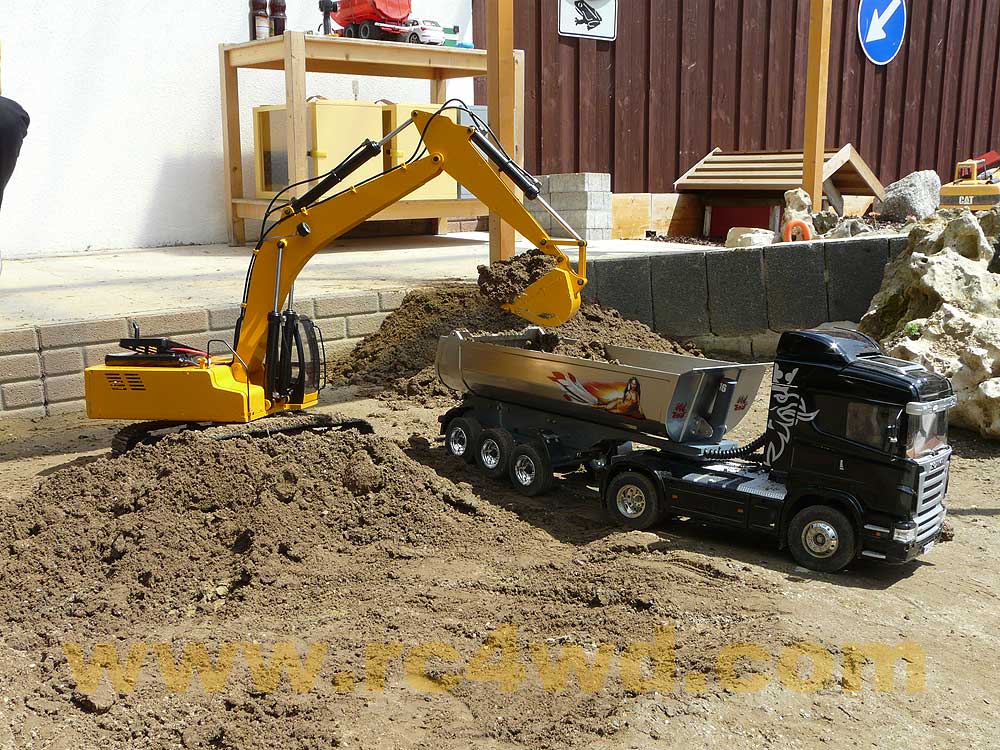Discover the Importance of Excavator in Modern Construction Projects
Excavators are necessary devices in contemporary building projects. Their adaptability permits them to carry out a vast array of jobs, from excavating and grading to demolition and site prep work. Advanced attributes, such as hydraulic add-ons and GPS, boost their abilities and efficiency on job websites. As the market progresses, the importance of excavators grows much more. Understanding their function can disclose insights into the future of building techniques. What lies ahead for these machines?
The Convenience of Excavators in Numerous Projects
Although excavators are typically connected with large-scale construction jobs, their flexibility permits them to be made use of in a wide variety of applications, from domestic landscaping to utility maintenance. In metropolitan settings, excavators can browse tight areas to dig foundations for homes or mount drainage systems. Their capacity to execute delicate tasks makes them optimal for landscape design projects, where they can excavate for fish ponds or plant trees. On top of that, excavators play a crucial duty in energy maintenance, successfully excavating trenches for pipes or cable televisions without disrupting surrounding locations. In agricultural applications, they assist in land cleaning and soil prep work. Their flexibility enables them to be geared up with numerous attachments, enhancing their capability throughout different tasks. This complex nature of excavators not just improves numerous construction processes however additionally demonstrates their integral duty in contemporary infrastructure development and upkeep.
Secret Functions and Kinds Of Excavators
The conversation on vital functions and sorts of excavators highlights the necessary characteristics that make these equipments very useful in building. Different excavator kinds, each designed for specific jobs, show their convenience and efficiency throughout different applications. rc excavator. Recognizing these attributes and categories is essential for optimizing their use in contemporary building and construction projects
Excavator Keys In Review
Excavators play a crucial duty in contemporary building and construction, providing adaptability and effectiveness throughout numerous jobs. These hefty machinery units can be found in numerous types, each tailored for specific applications. The most usual types include spider excavators, understood for their security on uneven surface, and wheeled excavators, which offer higher flexibility on smooth surface areas. Miniature excavators are favored for small-scale jobs and limited areas, while long-reach excavators are made for deep digging. In addition, there are specific excavators, such as hydraulic excavators, which improve power and precision. Each kind features unique capabilities, making them necessary for jobs varying from excavating and grading to demolition and product handling. Understanding these variations allows construction specialists to select the best excavator for their project requires.
Secret Features Explained
Understanding the vital functions of excavators improves their effective application in building and construction jobs. Excavators are identified by their powerful hydraulic systems, which give the essential force for digging, training, and relocating materials. Their articulated arms permit a variety of movement, assisting in accurate procedures in constrained rooms. In addition, the variety of accessories, such as containers, grapples, and augers, broadens their convenience to meet different project requirements. The size and weight of excavators also add to their stability and maneuverability on numerous terrains. Additionally, improvements in technology have actually resulted in the integration of GPS and automation, enhancing accuracy and effectiveness in excavation jobs. These features collectively position excavators as important devices in modern building.
Applications in Building
Changing building and construction sites, excavators play a crucial role throughout various applications, varying from domestic structure projects to large-scale infrastructure advancements. These functional equipments are furnished for jobs such as excavating foundations, trenching for utilities, and site grading. Various types of excavators, including crawler, rolled, and mini excavators, supply specific advantages customized to the job requirements. Spider excavators excel in rough terrains, while wheeled excavators provide movement on paved surface areas. Mini excavators are ideal for restricted areas, making them popular in urban settings. The effectiveness and power of excavators substantially speed up construction procedures, guaranteeing prompt project conclusion. Their adaptability further boosts their importance, enabling building groups to deal with a diverse variety of challenges efficiently.
Enhancing Efficiency and Efficiency on Job Sites
Making best use of performance and performance on job websites is a critical purpose in modern-day building and construction. Excavators play a pivotal role in accomplishing this goal by streamlining various jobs. Their ability to carry out several features-- such as digging, lifting, and grading-- decreases the need for additional equipment, thus conserving time and resources.Moreover, excavators enhance process by enabling faster conclusion of jobs. With innovative functions like hydraulic add-ons and GPS modern technology, they can implement exact operations that decrease mistakes and rework. This accuracy not just enhances the top quality of job however also maximizes material use, contributing to cost savings.The convenience of excavators allows them to adjust to various website conditions, making certain that tasks progress efficiently despite difficulties. By integrating excavators More Bonuses right into construction procedures, groups can significantly increase their overall performance, bring about prompt job completion and raised productivity.
Security Benefits of Utilizing Excavators
Excavators greatly boost security on building and construction websites through enhanced driver presence and decreased manual labor risks. By offering drivers with a clear view of their surroundings, excavators aid to avoid accidents and injuries. Furthermore, the machinery lessens the need for employees to participate in unsafe hands-on jobs, further advertising a safer workplace.
Enhanced Operator Visibility
Although building and construction sites can be disorderly and filled with prospective dangers, enhanced operator visibility plays a crucial duty in making certain safety and security when making use of excavators. Modern excavators are made with big, unobstructed image source home windows and purposefully put mirrors, allowing drivers to keep a clear view of their surroundings (rc excavator). This enhanced visibility is vital for finding pedestrians, various other machinery, and numerous challenges, considerably reducing the threat of mishaps. Additionally, numerous excavators include innovative innovation, such as cams and sensors, to provide operators with added point of views, better boosting recognition. The capability to see more clearly not just aids in efficient operation but additionally promotes a more secure work atmosphere, making it much easier for operators to browse intricate construction sites without compromising security standards
Decreased Guidebook Labor Risks
When manual labor is decreased through using excavators, various safety benefits arise, considerably enhancing the wellness of building employees. Excavators reduce the physical pressure related to heavy lifting and repeated jobs, properly lowering the danger of bone and joint injuries. By automating processes such as excavating, grading, and moving materials, they permit employees to preserve a more secure range from possible threats. Furthermore, excavators are equipped with advanced safety functions, such as rollover defense systems and boosted operator ergonomics, which better safeguard personnel on website. The result is a considerable decrease in workplace mishaps and injuries, bring about increased efficiency and spirits among building groups. Eventually, the adoption of excavators adds to a much safer and a lot more efficient building and construction environment.
Excavators in Earthmoving and Website Prep Work
In contemporary building, a substantial portion of earthmoving and site prep work jobs counts on the efficiency and convenience of excavators. These devices are developed to take care of different soil types and terrain, making them crucial for grading, excavating, and trenching tasks. Their hydraulic arms look these up can be outfitted with different attachments, such as augers and buckets, enabling drivers to tailor their approach based on details project requirements.Excavators excel at moving huge quantities of earth rapidly and effectively, which accelerates the total building and construction timeline. They can navigate limited areas and testing websites where conventional tools might struggle, boosting productivity. Furthermore, the precision of excavators guarantees that website preparation complies with stringent requirements, minimizing the threat of errors that could bring about costly rework.
The Function of Excavators in Demolition Tasks
Excavators play an essential function in demolition jobs, as they have the power and agility needed to take apart frameworks efficiently. Equipped with various accessories such as hydraulic breakers, shears, and grapples, these machines can adjust to different demolition demands, whether for small buildings or large industrial sites. Their convenience allows drivers to take on complex jobs while keeping security and precision.In enhancement to their demolition abilities, excavators facilitate debris elimination, making sure that job websites stay safe and organized. By damaging down structures into manageable items, they permit streamlined clearing and recycling of products, aligning with modern-day sustainability efforts.Moreover, excavators can access tight spaces and browse unequal terrain, making them essential in metropolitan demolition tasks. On the whole, their robust design and multifunctionality make excavators a crucial asset in the demolition stage of building and construction, adding significantly to task timelines and efficiency.


Future Fads in Excavator Modern Technology and Use
As the construction industry advances, developments in excavator innovation are positioned to transform their use and performance considerably. One substantial pattern is the assimilation of automation and synthetic knowledge, permitting excavators to operate with marginal human intervention. This change will enhance accuracy in jobs such as grading and trenching, reducing human error and boosting productivity.Additionally, the surge of hybrid and electrical excavators is forming a more lasting building atmosphere, decreasing carbon exhausts and fuel expenses. Improved telematics systems are additionally arising, making it possible for real-time monitoring of equipment efficiency and maintenance requirements, which can bring about better functional performance and longer tools lifespan.Moreover, improvements in add-on innovation are increasing the versatility of excavators, allowing them to execute a more comprehensive series of jobs. The mix of these fads shows a future where excavators are smarter, greener, and more adaptable, inevitably improving building and construction job dynamics.
Frequently Asked Concerns
Just How Do Excavators Compare to Other Building And Construction Machinery?
Excavators, characterized by their flexibility and power, master excavating and earthmoving contrasted to various other machinery. Their ability to do various tasks, consisting of lifting and demolition, makes them indispensable in building and construction jobs, boosting total performance.

What Is the Ordinary Life-span of an Excavator?
The ordinary life expectancy of an excavator generally varies from 7,000 to 10,000 operating hours, depending on maintenance, usage conditions, and version. Proper treatment can extend this lifespan, making sure peak performance throughout its operational years.
Just How Are Excavators Kept for Optimal Efficiency?
Excavators call for regular maintenance for peak performance, including routine inspections, liquid checks, filter substitutes, and timely repair services. Carrying out a preventative upkeep timetable aids extend their life expectancy and warranties reliable procedure in different building environments.
What Are the Costs Connected With Leasing vs. Acquiring an Excavator?
The costs connected with getting an excavator versus renting out differ significantly. Renting offers lower upfront costs but can build up in time, while purchasing calls for a considerable first investment, but provides long-lasting savings and property ownership benefits.
What Training Is Needed to Operate an Excavator?
Operating an excavator requires specialized training, normally including security protocols, machine operation strategies, and ecological recognition. Qualification programs often mandate functional experience, making it possible for drivers to manage various jobs efficiently while making certain compliance with industry guidelines. The most common kinds consist of spider excavators, understood for their stability on irregular surface, and rolled excavators, which give better mobility on paved surfaces. Small excavators are favored for tight spaces and small-scale jobs, while long-reach excavators are developed for deep digging. Furthermore, there are specific excavators, such as hydraulic excavators, which improve power and accuracy. Different kinds of excavators, consisting of crawler, rolled, and mini excavators, give particular benefits customized to the project needs. Spider excavators stand out in rough surfaces, while rolled excavators supply movement on smooth surfaces.
Comments on “Can a rc excavator Save You Time and Money? Here’s How”